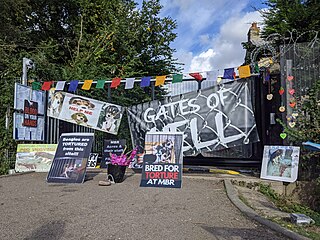Stop Huntingdon Animal Cruelty (SHAC) was an international animal rights campaign to close down Huntingdon Life Sciences (HLS), Europe's largest contract animal-testing laboratory. HLS tests medical and non-medical substances on around 75,000 animals every year, from rats to primates. It has been the subject of several major leaks or undercover investigations by activists and reporters since 1989.
Barry Horne was an English animal rights activist. He became known around the world in December 1998 when he engaged in a 68-day hunger strike in an effort to persuade the government to hold a public inquiry into animal testing, something the Labour Party had said it would do before it came to power in 1997. The hunger strike took place while Horne was serving an 18-year sentence for planting incendiary devices in stores that sold fur coats and leather products, the longest sentence handed down to any animal rights activist by a British court.
Keith Mann is a British animal rights campaigner and direct action activist who acted as a spokesman for the Animal Liberation Front (ALF), and was alleged by police in 2005 to be a ringleader for the ALF. He was imprisoned twice, and is the author of From Dusk 'til Dawn: An Insider's View of the Growth of the Animal Liberation Movement (2007).
The Animal Rights Militia (ARM) is a banner used by animal rights activists who engage in direct action utilizing a diversity of tactics that ignores the Animal Liberation Front's policy of taking all necessary precautions to avoid harm to human life.
The Justice Department (JD) was founded in the United Kingdom by animal liberation activists who declared they were willing to use a diversity of tactics up to and including violence against their opponents. Calling for "abusers to have but a taste of the fear and anguish their victims suffer on a daily basis", activists distanced themselves from the Animal Liberation Front's guidelines of nonviolent resistance.

The animal rightsmovement, sometimes called the animal liberation, animal personhood, or animal advocacy movement, is a social movement that advocates an end to the rigid moral and legal distinction drawn between human and non-human animals, an end to the status of animals as property, and an end to their use in the research, food, clothing, and entertainment industries.
Shamrock Farm was the United Kingdom's only non-human primate importation and quarantine centre, located in Small Dole, near Henfield in West Sussex. The centre, owned by Bausch and Lomb and run by Charles River Laboratories, Inc. for Shamrock (GB) Ltd, provided animals to various laboratories and universities for use in animal testing. It was Europe's largest supplier of primates to laboratories, and held up to 350 monkeys at a time.
Animal Liberation Leagues were a network of animal rights organizations active in the UK in the 1980s. Whereas the Animal Liberation Front specialized in clandestine activity, mainly masked, at night, and involving small numbers of people, the Animal Liberation Leagues consisted of coordinated raids, or 'invasions', by a large number of people, mainly carried out during the day. One journalist described the Animal Liberation Leagues as "a sophisticated...development in the move to direct action". Raids were often carried out at the same time as legal demonstrations.
Shannon Keith is an American animal rights lawyer, activist, and documentary director/producer. She is the director of the Animal Liberation Front documentary, Behind the Mask: The Story Of The People Who Risk Everything To Save Animals.
This timeline of Animal Liberation Front (ALF) actions describes the history, consequences and theory of direct action on behalf of animals by animal liberation activists using, or associated with the ALF.
Save the Hill Grove Cats was a British animal rights campaign set up in 1997 with the aim of closing Hill Grove Farm near Witney in Oxfordshire. The farm, owned by Christopher Brown, was the last commercial breeder of cats for laboratories in the United Kingdom. Eight hundred cats were removed by the RSPCA on August 10, 1999, when Brown announced his decision to retire after a controversial two-year campaign.
The Western Animal Rights Network (WARN) first appeared in 2005 as a coalition for animal rights groups in the West of England and South Wales and acted as a news service for animal rights demos and action reports.

Arkangel was a British-based bi-annual animal liberation magazine, first published in the winter of 1989. The magazine, which was sold internationally, covered global aspects of underground and overground animal rights campaigning, and promoted a vegan lifestyle. The magazine ceased publication in 1999.

The Animal Liberation Front (ALF) is an international, leaderless, decentralized movement that emerged in Britain in the 1970s, evolving from the Bands of Mercy. It operates without a formal leadership structure and engages in direct actions aimed at opposing animal cruelty.
Mel Brown is a British landscape gardener and animal rights activist who rose to public prominence due to a planned bombing campaign aimed at preventing the construction of a new research laboratory at Oxford University. He was the co-founder in 2004, with Robert Cogswell, of SPEAK, The Voice for the Animals, a campaign to stop animal testing in Britain, which is focused on opposition to a new animal laboratory at Oxford University.
Heather Nicholson is a British animal rights activist.
Wickham Laboratories Ltd is a contract testing laboratory that supports the pharmaceutical and medical device industries. Located in Hampshire, England, it was founded in 1962 and remains an independent company.

Harlan Sprague Dawley Inc. was a supplier of animals and other services to laboratories for the purpose of animal testing. It provided pre-clinical research tools and services for the pharmaceutical, biotechnology, agrochemicals, industrial chemical, and food industries.
The campaign against Highgate Rabbit Farm, also known as the Close Highgate Farm campaign, is a series of direct actions by anti-vivisection activists. Highgate Rabbit Farm in Market Rasen, Lincolnshire in England is licensed by the Home Office to breed rabbits and ferrets for animal-testing facilities, including Huntingdon Life Sciences. Actions have included a raid by the Animal Liberation Front (ALF) and an arson claimed by the Militant Forces Against HLS. The ALF raid in 2008 saw 129 rabbits removed and £100,000-worth of damage to property. The campaign has been linked to activists involved in Stop Huntingdon Animal Cruelty (SHAC).

Camp Beagle is an ongoing protest camp set up in June 2021 by animal rights activists outside of MBR Acres, a breeding facility for beagles used in laboratory research, in Wyton, Cambridgeshire. As of May 2024, It is the longest-lasting protest camp of its kind, where protesters have maintained a permanent presence, as they want the site to be closed down.